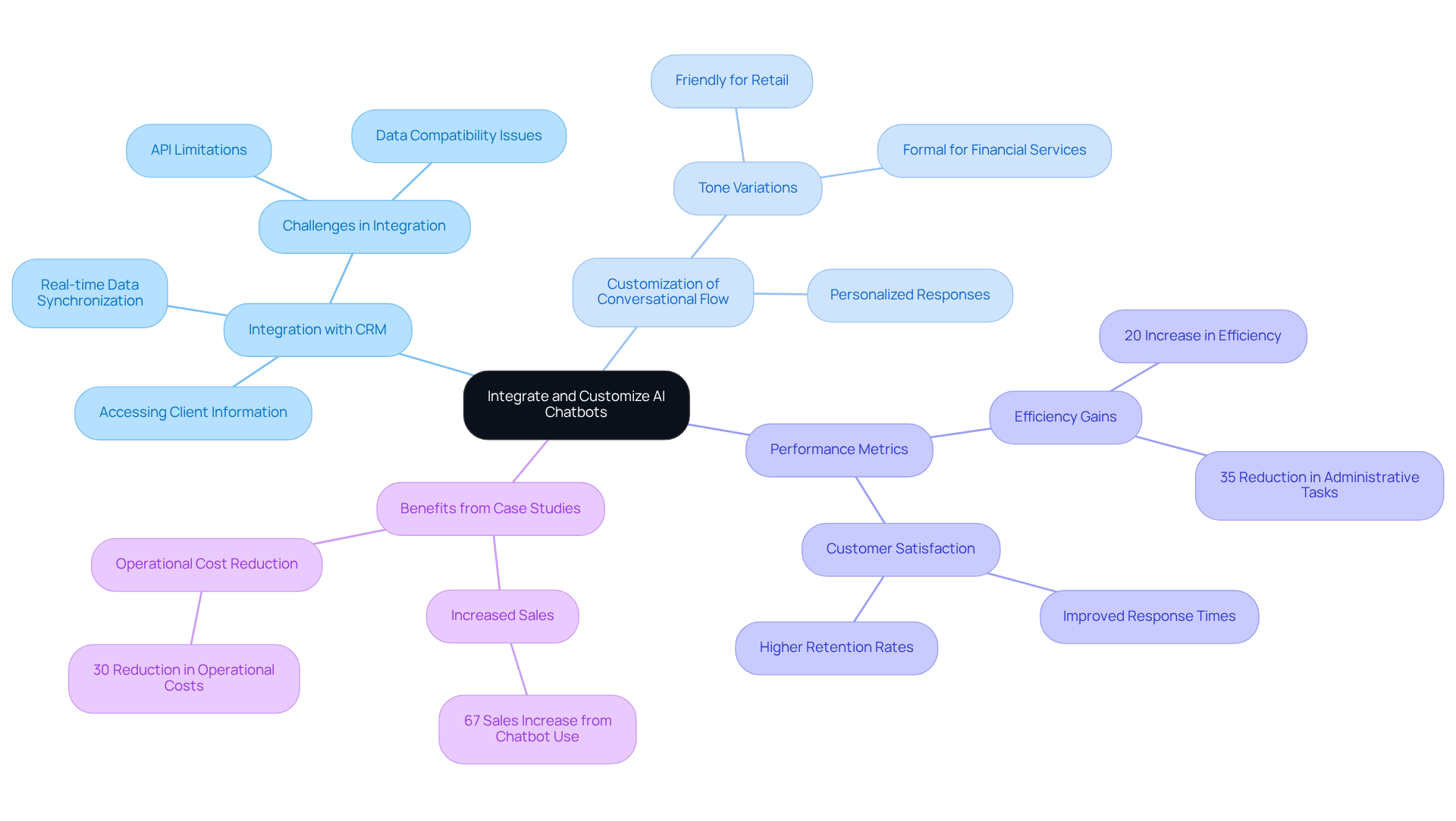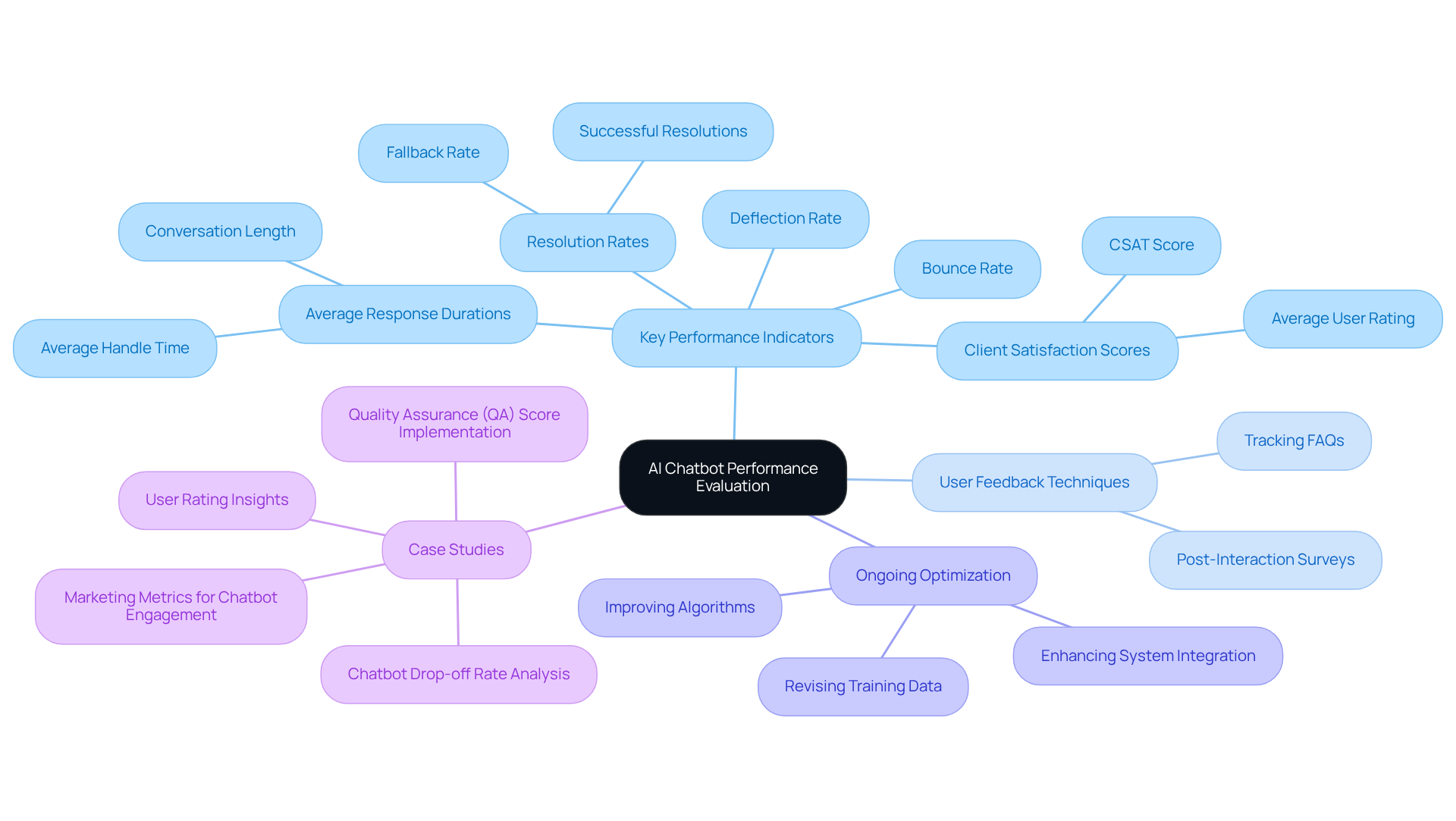
4 Strategies to Use AI Chatbot for Customer Service Effectively
GeneralOverview
The article presents four effective strategies for leveraging AI chatbots in customer service, specifically targeting:
- Enhanced efficiency
- Seamless integration
- Tailored customization
- Rigorous performance evaluation
By automating routine tasks and providing 24/7 support, organisations can integrate these systems with existing frameworks, thereby significantly improving customer satisfaction and operational effectiveness. This is not merely theoretical; case studies and statistical insights within the article substantiate these claims, illustrating the transformative impact of AI solutions. Embrace these strategies to elevate your customer service experience.
Introduction
The rise of AI chatbots signifies a transformative shift in customer service, empowering businesses to enhance efficiency and responsiveness like never before. By automating routine inquiries and providing 24/7 support, these intelligent systems streamline operations and significantly boost customer satisfaction. However, the challenge lies in effectively implementing and optimising these tools to truly harness their potential.
What strategies can organisations employ to ensure their AI chatbots deliver exceptional service and foster lasting customer loyalty? It is crucial for businesses to explore these strategies to fully realise the benefits of AI solutions.
Understand the Fundamentals of AI Chatbots
AI conversational agents represent a significant advancement in software applications, meticulously crafted to emulate human conversation through both text and voice interactions. These systems harness cutting-edge technologies, including Natural Language Processing (NLP) and Machine Learning (ML), to effectively comprehend and respond to user inquiries. By understanding these essentials, companies can appreciate the capabilities and limitations of automated assistants, allowing them to set realistic performance expectations.
Consider the impact: an AI chatbot for customer service adeptly handles routine questions, delivers immediate responses, and operates continuously, significantly enhancing service efficiency. Recent statistics reveal that:
- 90% of businesses have seen faster complaint resolution thanks to automated assistance.
- 61% of respondents assert that these systems can boost productivity by automating task follow-ups.
Such insights are crucial for organisations intent on effectively integrating an AI chatbot for customer service into their service strategies.
Effective applications, exemplified by Sephora’s AI chatbot for customer service, which achieved an impressive 11% increase in conversion rates, showcase the potential of these tools to elevate client interactions. As the chatbot market continues to expand—predictions estimate a value of $15.57 billion by 2025—understanding the impact of NLP on chatbot performance becomes increasingly vital for organisations aiming to enhance their client engagement.
Leverage AI Chatbots to Enhance Customer Service Efficiency
AI chatbots for customer service are crucial in enhancing service efficiency by automating routine tasks and providing immediate assistance. They proficiently handle frequently asked questions, process orders, and facilitate appointment scheduling, thereby relieving human agents of these responsibilities. This enables agents to focus on more intricate issues that require personal attention.
Furthermore, an AI chatbot for customer service ensures 24/7 accessibility, guaranteeing that clients receive support at any time—a significant advantage for companies with a global clientele. Notably, 35% of inquiries to AI assistants occur when contact centres are closed, underscoring the importance of round-the-clock support.
The implementation of an AI chatbot for customer service has been shown to considerably reduce average response times, with some organisations reporting a decrease of up to 50%. This leads to improved satisfaction rates; a favourable interaction with AI support software can boost satisfaction by as much as 20%.
Ultimately, the integration of an AI chatbot for customer service not only enhances operational efficiency but also cultivates greater customer loyalty, as companies employing emotion-driven strategies have seen a 30% increase in loyalty. For example, Barking & Dagenham council achieved an impressive 533% return on investment (ROI) within just nine months of launching an AI assistant, demonstrating the tangible benefits of conversational agents in practical applications.
Integrate and Customize AI Chatbots for Optimal Performance
To achieve optimal performance, organisations must integrate an AI chatbot for customer service with their existing systems, including Customer Relationship Management (CRM) platforms and databases. This integration empowers the AI chatbot for customer service to access pertinent client information, facilitating personalised interactions. Customization plays a crucial role; businesses should tailor the conversational flow, tone, and responses to reflect their brand voice and meet customer expectations. For instance, a retail virtual assistant might adopt a friendly and casual tone, while a financial services virtual assistant may take on a more formal approach. Regularly updating the virtual assistant’s knowledge base and training it with high-quality information will enhance its performance over time.
Case studies underscore the advantages of this integration. Organisations that successfully incorporated AI virtual assistants with their CRM systems reported a 20% increase in efficiency and a 35% reduction in administrative tasks, as highlighted in research on the economic benefits of AI virtual assistants in client service. Furthermore, statistics reveal that 63% of retailers utilise an AI chatbot for customer service to enhance client interactions, confirming the growing trend of personalization in chatbot implementation. By customising conversational agents to align with their brand voice, companies can significantly boost performance metrics, resulting in improved customer satisfaction and loyalty. As we approach 2025, the importance of integrating AI conversational agents with CRM systems will only escalate, making it imperative for organisations to adopt these strategies for optimal performance.

Evaluate and Optimize AI Chatbot Performance Regularly
To ensure the ongoing effectiveness of AI chatbots, businesses must establish and regularly evaluate key performance indicators (KPIs). These key metrics encompass:
- Client satisfaction scores, which represent user experiences—statistics reveal that an average user rating between 1-2.8 stars signifies low satisfaction.
- Average response durations, such as an average handle time of 1 minute, signify efficiency.
- Resolution rates assess the system’s capability to address problems.
A high customer satisfaction score can indicate that the automated assistant is effectively addressing user needs, whereas a low score may reveal areas needing improvement.
Gathering user feedback is crucial for identifying opportunities for improvement. Techniques such as:
- Tracking frequently asked questions
- Conducting post-interaction surveys
provide valuable insights into user experiences and expectations. Ongoing optimization may entail revising the training data, improving algorithms, and enhancing integration with other systems to ensure smooth interactions.
Statistics indicate that the typical automated conversation endures approximately three minutes, offering a standard for user engagement. However, conversations exceeding five minutes may indicate inefficiencies that could negatively impact brand perception. By committing to regular assessment and enhancement, companies can transform their chatbots into efficient instruments for improving customer service, ultimately resulting in greater customer satisfaction and loyalty.
Case studies demonstrate that organisations employing structured performance tracking have effectively identified and addressed issues, leading to improved automated assistance and user engagement. For example, businesses that monitor their chatbot’s bounce rate—currently averaging 25%—can make necessary adjustments to enhance initial interactions and retain users. By focusing on these strategies, companies can ensure their chatbots remain valuable assets in their customer service arsenal.

Conclusion
AI chatbots have emerged as transformative tools in customer service, enabling businesses to enhance efficiency and significantly improve client interactions. By understanding the fundamentals of these technologies, organisations can effectively leverage their capabilities to meet customer needs while setting realistic expectations for performance.
This article outlines several key strategies for maximising the impact of AI chatbots in customer service:
- Automating routine inquiries
- Ensuring 24/7 availability
- Integrating with existing systems for personalised experiences
- Regularly evaluating performance metrics
Case studies from Sephora and Barking & Dagenham council illustrate the tangible benefits of adopting AI chatbots, showcasing increased conversion rates and substantial returns on investment.
As businesses navigate the evolving landscape of customer service, the integration of AI chatbots will play a crucial role in shaping customer experiences. Companies are encouraged to adopt these strategies to enhance operational efficiency and foster customer loyalty and satisfaction. Embracing AI chatbot technology is not merely an option; it is a vital step toward future-proofing customer service operations in an increasingly digital world.
Frequently Asked Questions
What are AI chatbots?
AI chatbots are advanced software applications designed to simulate human conversation through text and voice interactions, utilising technologies like Natural Language Processing (NLP) and Machine Learning (ML) to understand and respond to user inquiries.
How do AI chatbots improve customer service?
AI chatbots enhance customer service by efficiently handling routine questions, providing immediate responses, and operating continuously, which significantly increases service efficiency.
What are the benefits of using AI chatbots in businesses?
Businesses have reported faster complaint resolution (90% of businesses) and increased productivity (61% of respondents) due to the automation of task follow-ups by AI chatbots.
Can you provide an example of a successful AI chatbot application?
An example is Sephora’s AI chatbot for customer service, which resulted in an 11% increase in conversion rates, demonstrating the potential of chatbots to enhance client interactions.
What is the projected market value for AI chatbots by 2025?
The chatbot market is expected to reach a value of $15.57 billion by 2025, indicating significant growth and interest in these technologies.
Why is understanding NLP important for organisations using chatbots?
Understanding the impact of Natural Language Processing (NLP) on chatbot performance is vital for organisations to effectively enhance client engagement and set realistic performance expectations for their automated assistants.
Enjoyed this post? Share it with your network!
10 Best AI Sales Tools to Boost Your Team’s Performance

Discover the top 10 best AI sales tools to enhance team performance and drive revenue growth.
Mastering Test Call Numbers: A Step-by-Step Guide for Sales Directors

Elevate your communication with our guide on mastering test call numbers for sales success.
7 Ways Automated Outbound Calls Boost Sales Performance

Discover how automated outbound calls enhance sales performance and streamline communication.
